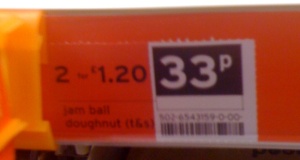As we finish the Edinburgh & Lothians maths masterclasses (which have been a great success!) I am still following the efforts of another group of young people – those on The Young Apprentice.
These are apparently the best 12 young entrepreneurs of the country, chosen from many thousands to compete for Alan Sugar’s money to set up a new business of their own. Initially they were divided into two teams (boys and girls) and asked to choose names for their teams. Independently, both teams went for science-sounding names: Atomic and Kinetic. This bodes well, I thought. At the very least, it shows that young people view science as exciting and fast-paced; at best, maybe these future entrepreneurs have a deep appreciation for maths and science.
Ha! Wishful thinking.
Despite the Physics-sounding team names, only 2 of the 12 contestants are studying any kind of science, and in both cases it is Biology. 3 of them are doing an A-Level in Maths and a few more in Economics, but we’ll see soon enough that this implies nothing about their basic arithmetical skills.
Episode 1: The contestants have to make and sell their own brand of ice cream. Problems start early on, when they have to work out how many kilograms of ingredients are necessary to make so many litres of ice cream. Not just that, but they have to work out, given how many scoops they can sell in an hour, how many litres to make in the first place, and how much profit will accrue from various costings. The voice-over dubs this ‘A-Level Maths’. Hmm. Is multiplication and division really not taught before the age of 16 any more?
But maybe the voice-over man is right. The boys have a team member with A-level maths, who copes fine with the numbers. The girls, on the other hand, have sent both their A-levellists off to do the design work, leaving chaos behind them. The remaining team think a gram is equivalent in weight to a litre. They think 3 x 4 is 28. “The real surprise here is that the team cannot add up, subtract, divide or multiply”, says a bewildered Nick Hewer, who is keeping an eye on proceedings. In the boardroom, the project leader defends herself saying “I only have a GCSE in maths”, to which Lord Sugar responds with “I don’t care if you only have air miles in maths – this is baby stuff!”
Episode 2: The contestants have to design a new product for the mother & baby market. Thankfully it’s more about market research and good pitching than making and selling this week, so no maths to worry about.
Episode 3: The contestants have to set up their own floristry businesses, designing and selling displays to corporate customers, as well as flogging bouquets on the street. Each team is divided into two, with some people staying behind to learn flower arranging and the others going to win deals with companies. Maths makes an early appearance, with one team leader choosing to keep one of the girls in the flower arranging group, despite her being a proven success at pitching to companies. The reason? Because she’s the only one who can do the maths in pricing the displays.
One of the boys, who had got the highest score in GCSE Economics in Northern Ireland, proclaimed “I’m not very good with numbers.” Prompted further, he said “There’s not a lot of numbers in Economics”, to which Lord Sugar replied “We’re not talking about quantum physics here, are we? We’re talking ‘this rose costs 40p, so 10 roses costs £4’.”
In the end though, the most frustrating thing for me about watching the show is that the team who gets it right every week is almost certain to lose the task! The teams who work hard to correctly do their costings, to make a good product and to provide good customer service always fall down because they haven’t overcharged for their product like the other team have. It is depressing to live in a world where being ruthless and greedy gets you further in life than being honest and intelligent, and even more depressing to think that young people will be watching this programme and learning exactly this lesson.



Posted by Frank on November 29, 2011 at 4:07 pm
I agree that their Maths skills as presented on TV are appalling. It is a reality TV show, though, and you have to remember that they are deliberately presented in the most dramatic way possible, so that every flaw gets exaggerated. Best to take it with a grain of salt…
Posted by haggisthesheep on November 29, 2011 at 5:52 pm
You’re right, and it could well be that the pressure from having the camera on them makes their arithmetic skills get even worse. (I know I’m no good under pressure!) But even taking that into account, it is worrying that highly intelligent people leaving school feel uncomfortable with basic maths. Which bit of our education system has failed them?
Posted by Mike on December 12, 2011 at 4:31 pm
I once walked into an office to find 2 secretaries (both in their 20s) looking confused–one of them had to do something that involved converting some values from centimeters to millimeters and they were both baffled!
I kept asking ‘you mean centimeters to inches right?’. Nope, they mean millimeters. Apparently the terms: mm and cm, and how they relate to each other means nothing to them. I think they were also somewhat annoyed that they were expected to know such ‘technical’ stuff.
Posted by Ryan Budney on December 20, 2011 at 8:10 am
I was just at a “communicating with commercial media” workshop. We watched a report a local TV broadcaster did on research where I work. One of the gems was “Every year, 1 in 7 men is diagnosed with prostate cancer.” ! This made it past the researchers, reporters and their editors. It also was aired on TV with no criticism from the television audience, which as far as I know consists of thousands of people.